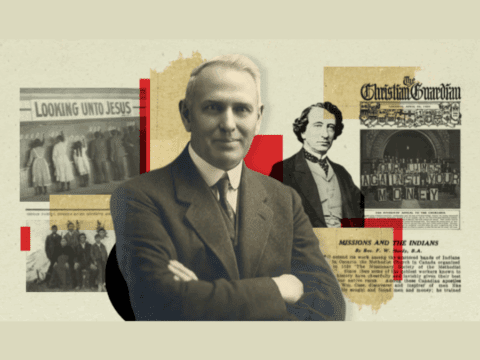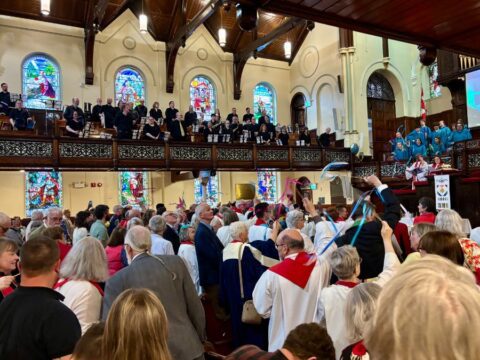The Christmas season is again upon us, and once more two men are vying for prominence: Jesus Christ, whose birth more than two millennia ago is still the “reason for the season” for most churchgoers; and Santa Claus, the pretender who plays a very strong supporting role in an increasingly secular and materialistic society.
The two men couldn’t be more different. Jesus brings gifts of mercy, love and hope. Santa comes laden with a big sack of dazzle. Jesus extends an olive branch and a promise of everlasting life, while Santa’s big laugh and jolly old cheer light up the eyes of the young.
There’s no question that Jesus’ birth remains at the forefront of Christmas celebrations in the United Church, but increasingly Santa is encroaching on his territory. Santa has long been a welcome presence in congregational life — there are breakfasts with Santa, and he often features in family movie nights and Christmas plays — but now he’s inching his way closer to the pulpit.
This Christmas Eve at Symons Valley United in Calgary, for example, he’ll be making an appearance along with Scrooge as part of an Advent dialogue being presented by Rev. Sarah Fanning.
“The theme of the service is whether or not it’s appropriate to have Santa in church,” says Fanning, who believes the answer is a resounding yes. “There’s a line I’ll be reading that says, ‘If you listen carefully when Santa laughs, you can hear the echo of the angels singing.’ There’s no doubt that Santa does bring tidings of comfort and joy at this time of year.”
Rev. Susan Lukey of High River (Alta.) United has often included stories about Santa in children’s time and fondly recalls attending a church service as a theological student where the minister delivered a sermon dressed in character as St. Nicholas. She has no problem reconciling the magic of Santa with the message of Christ.
“The fact that someone would go to the ends of the Earth all in one night to bring love and joy to people’s hearts is at the core of the Santa story, and it’s something we all want. Really, Santa is a reflection of Jesus.”
But others have a problem with bringing this secular character into the sanctuary. Rev. Sheila Campbell of Riverside-Emery United in Toronto is one of them, and she makes no apologies for it.
“Consumerism has put Santa on top of Jesus and usurped our religious celebration and made it into something that’s all about greed,” she says. “You can’t serve two masters, and that’s what we do when we incorporate Santa into church services. Santa is about marketing; Jesus is about our faith. Do we really think our message is so poor that we have to dress it up with Santa? I don’t think so.”
Campbell faced a barrage of criticism when she “outed” Santa as a fairy tale in a play she wrote for White Gift Sunday in her church. “I told the parents that I was going to talk about Santa, and they may not appreciate what I was going to say, and they could put their hands over their kids’ ears.”
When her play was posted as a worship resource on The United Church of Canada’s website, one woman responded that Campbell shouldn’t be allowed to be a United Church minister because of what she’d written.
“This woman had a daughter who was 12 years old, and she said she wanted her daughter to believe in Santa for as long as possible. My thought was, why aren’t you putting that energy into making Christ alive in her life?” says Campbell.
One way churches can make the introduction of Santa more palatable is by putting the focus on St. Nicholas, a third-century Greek bishop who took to heart Jesus’ words to help the poor. He became known for secret gift-giving, such as tossing bags of gold into the home of three young women who would be sold into slavery because they had no dowry. He also put coins into shoes that people had left out for him, thus becoming the model for Santa Claus.
“There’s more meaning in the St. Nicholas story than in the Santa story,” says Lukey. “I’m inspired and challenged by the real St. Nicholas, who embraced the teachings of that child born so long ago in a stable and made them the foundation for how he lived his life.”
Rev. Norm Pettersson, a retired United Church minister in Surrey, B.C., agrees. “Santa is a happy myth because it’s all about generosity and caring. And anytime I can connect that to the story of St. Nicholas dropping the dowry money for the poor children, I do.”
While Pettersson is entirely pro-Santa — for the past decade, he has worked full time throughout the Christmas season playing Santa at local malls and nursing homes — even he has some limits. He once heard of a fellow United Church minister who had Santa help serve communion.
“That’s blurring the lines too much between society’s values and the church’s values,” he says. “Context is important. If Santa is presented for pure entertainment value, I’d rather keep him out of the worship service.”
He still believes in the magic of Santa. In fact, he’s experienced it hundreds of times when young children sit on his knee and share their hopes and dreams. One young girl asked him to say a prayer for her dying father. Other kids ask for world peace.
“When you hear this from a seven- or eight-year-old kid instead of a request for all the stuff that’s advertised on TV, you know there’s been some positive teaching in the home,” he says.
Lukey shares a wonderful Santa story: a member of her congregation who sings in the choir also makes regular appearances in the community as Santa Claus. One Sunday, Lukey’s five-year-old son kept staring at this man in the choir, growing more and more excited.
After the service, he ran over to Lukey and exclaimed, “Mommy, Santa comes all the way from the North Pole to sing in our choir! Isn’t that amazing?”
“For him, that was a magical moment,” says Lukey. “And don’t we all need those kinds of magical moments in our lives?”
***
This story first appeared in The United Church Observer’s December 2013 issue with the title “Here comes controversy.”














